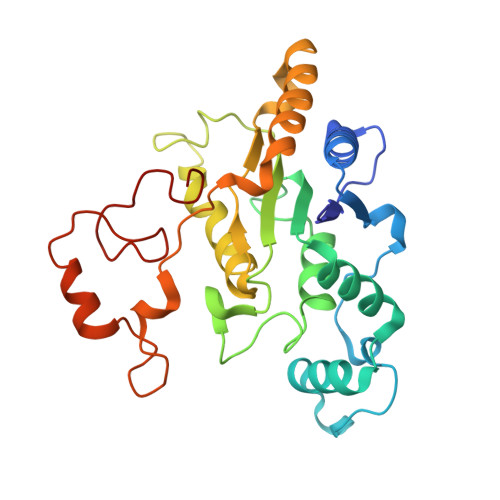Synthesis and biological evaluation of coumarin-based inhibitors of NAD(P)H: quinone oxidoreductase-1 (NQO1).
Nolan, K.A., Doncaster, J.R., Dunstan, M.S., Scott, K.A., Frenkel, A.D., Siegel, D., Ross, D., Barnes, J., Levy, C., Leys, D., Whitehead, R.C., Stratford, I.J., Bryce, R.A.(2009) J Med Chem 52: 7142-7156
- PubMed: 19877692
- DOI: https://doi.org/10.1021/jm9011609
- Primary Citation of Related Structures:
3JSX - PubMed Abstract:
The synthesis is reported here of two novel series of inhibitors of human NAD(P)H quinone oxidoreductase-1 (NQO1), an enzyme overexpressed in several types of tumor cell. The first series comprises substituted symmetric dicoumarol analogues; the second series contains hybrid compounds where one 4-hydroxycoumarin system is replaced by a different aromatic moiety. Several compounds show equivalent or improved NQO1 inhibition over dicoumarol, both in the presence and in the absence of added protein. Further, correlation is demonstrated between the ability of these agents to inhibit NQO1 and computed binding affinity. We have solved the crystal structure of NQO1 complexed to a hybrid compound and find good agreement with the in silico model. For both MIA PaCa-2 pancreatic tumor cells and HCT116 colon cancer cells, dicoumarol shows the greatest toxicity of all compounds. Thus, we provide a computational, synthetic, and biological platform to generate competitive NQO1 inhibitors with superior pharmacological properties to dicoumarol. This will allow a more definitive study of NQO1 activity in cells, in particular, its drug activating/detoxifying properties and ability to modulate oncoprotein stability.
- School of Pharmacy and Pharmaceutical Sciences, University of Manchester, Manchester Cancer Research Center, Manchester, M13 9PT, United Kingdom.
Organizational Affiliation:


















